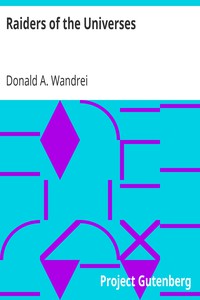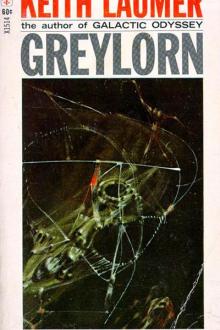Raiders of the Universes by Donald A. Wandrei (free books to read .txt) 📗

- Author: Donald A. Wandrei
Book online «Raiders of the Universes by Donald A. Wandrei (free books to read .txt) 📗». Author Donald A. Wandrei
Phobar always remembered that battle in the laboratory as a scene from some horrible nightmare. The catastrophe came so rapidly that he could hardly follow the whirlwind events. The half dozen great leaps he made from the lashing tentacles of his pursuer sufficed to give him a few seconds' respite, and then the weird, howling sound of the tortured world swelled to a piercing wail. His lungs were laboring from the violence of his exertions; again and again he barely escaped from the curling whips of metal tentacles. And now the monster was hardly a foot high; the huge condensers and tubes and colossal machinery were like those of a pygmy laboratory. And overhead the roof plunged ever downward.
But Phobar was cornered at last. He stood in the center of a circle of the foot-high things. His captor suddenly shot forth a dozen rope-like arms toward him as the others closed in. He had not even a weapon, for he had dropped the bar in his first mad bound away from the control-panel. He saw himself trapped in his own trick, for in minutes at most the laboratory would be crushing him with fearful force.
Blindly Phobar reverted to a primitive defense in this moment of infinite danger and kicked with all his strength at the squat monster before him. The thing tried to whirl aside, but Phobar's shoe squashed thickly through, and in a disorder of quivering pieces the metal creature fell, and subsided. Knowing at last that the invaders were vulnerable and how they could be killed, Phobar went leaping and stamping on those nearest him. Under foot, they disintegrated into little pulpy lumps of inert metal.
In a trice he broke beyond the circle and darted to the control-panel. One quick glance showed him that the roof was now scarcely a half dozen yards above. With fingers that fumbled in haste at tiny levers and dials, he spun several of them—the repulsion-ray full—the attraction-ray full. And when they were set, he picked up the bar he had dropped and smashed the controls so that they were helplessly jammed. He could almost feel the planet catapult through the heavens.
The laboratory roof was only a foot over his head. He whirled around, squashed a dozen tiny creeping things, leaped to a disk that was now not more than a few inches broad. Stooping low, balancing himself precariously, he somehow managed to close the tiny switch. A haze of orange light enveloped him, there came a great vertigo and dizziness and pain, he felt himself falling through bottomless spaces....
So exhausted that he could scarcely move, Phobar blinked his eyes open to brilliant daylight in the chill of a November Indian summer noon. The sun shone radiant in the heavens; off in the distance he heard a pandemonium of bells and whistles. Wearily he noticed that there were no flame-paths in the sky.
Staggering weakly, he made his way to the observatory, mounted the steps with tired limbs, and wobbled to the eyepiece of his telescope which he had left focused on the dark star two hours before. Almost trembling, he peered through it.
The dark star was gone. Somewhere far out in the abysses of the universe, a runaway world plunged headlong at ever-mounting speed to uncharted regions under its double acceleration of attraction and repulsion.
A sigh of contentment came from his lips as he sank into a heavy and profound sleep. Later he would learn of the readjustments in the solar system, and of the colder climate that came to Earth, and of the vast changes permanently made by the invading planet, and of a blazing new star discovered in Orion that might signify the birth of a sun or the death of a metallic dark world.
But these were events to be, and he demanded his immediate reward of a day's dreamless slumber.
Transcriber's Note:
This etext was produced from Astounding Stories September 1932. Extensive research did not uncover any evidence that the U.S. copyright on this publication was renewed. Minor spelling and typographical errors have been corrected without note.
End of Project Gutenberg's Raiders of the Universes, by Donald Wandrei




Comments (0)